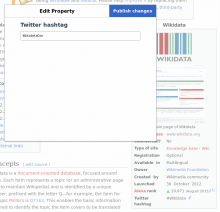As an editor, I want to edit based on the latest page data to avoid edit conflicts.
Problem:
Wikidata Bridge may currently load stale entity data, due to T128486 being unresolved.
Example:
If you edit a value in the Wikidata Bridge and reload the page, you’ll likely see the new value in the rendered page but the old value when you open the Bridge again.
The Twitter hashtag value on Beta Wikidata was changed from WikidataCon to Wikidata; the infobox has the new value (was automatically updated through change dispatching), but the bridge dialog loaded the entity data via the special page and got a stale value.
BDD
WHEN reopening the Bridge after an edit
THEN the latest data from the repository is shown
Acceptance criteria:
- always use freshest data from the repository when opening the Bridge
Info
- after a discussion in the team + tech lead it was decided to implement this by requesting entity information via wbgetentities instead of (currently) Special:EntityData
